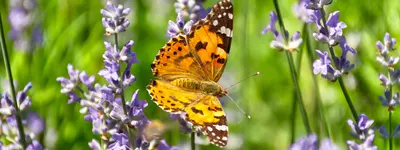
A biodiverse garden is a vibrant garden! By choosing the right plants, you can provide food and shelter for bees, butterflies, birds, and other wildlife. But which plants truly contribute to biodiversity? In this blog, you'll discover how to make your garden more inviting to various creatures and which plants play a key role in supporting nature.
Why is Biodiversity Important in the Garden?
Biodiversity is essential for a healthy ecosystem. Insects pollinate plants, birds help control pests, and a diverse selection of plants ensures a resilient garden. By consciously choosing native and nectar-rich plants, you support nature while enjoying a garden teeming with life.
Best Plants for Biodiversity
Below is a selection of plants that play an important role in a biodiverse garden.
1. Perennials and Flowers
These plants provide nectar and pollen, attracting a variety of insects:
- Lavender – A magnet for bees and butterflies.
- Coneflower (Echinacea) – A rich source of nectar for butterflies and bees.
- Autumn Aster – A late bloomer that helps insects in autumn.
- Salvia – Has a long flowering period and is highly attractive to bumblebees.
2. Native Plants
Native plants are well-adapted to the local environment and attract the right insects:
- Wild Marjoram (Origanum vulgare) – Excellent for butterflies and bees.
- Lesser Periwinkle (Vinca minor) – Provides ground cover and nectar.
- Oxeye Daisy (Leucanthemum vulgare) – A valuable flower for insects.
3. Shrubs and Bushes
- These plants provide food, nesting places, and shelter:
- Elderberry (Sambucus nigra) – Berries for birds and flowers for insects.
- Hawthorn (Crataegus monogyna) – A nesting place for birds and a nectar source for bees.
- Snowberry (Symphoricarpos albus) – Winter berries and shelter for small animals.
4. Trees that Promote Biodiversity
Trees are essential for many species. Some excellent choices include:
- Lime Tree (Tilia) – Rich in nectar and highly attractive to bees.
- Willow (Salix) – An early food source for insects.
- Oak (Quercus) – Supports a wide variety of insects and birds.
5. Herbs and Edible Plants
Not only decorative but also beneficial for insects:
- Thyme, Mint, and Rosemary – Fragrant and highly attractive to bees.
- Chives and Dill – Provide food for butterflies and other pollinators.
- Strawberry Plants – Flowers for bees, fruits for birds (and yourself!).
Other Ways to Support Biodiversity
Besides choosing the right plants, there are more ways to enhance biodiversity in your garden:
- Ensure a variety of blooming periods so there is food available year-round.
- Leave spent plants and fallen leaves to provide shelter for insects.
- Install an insect hotel to support solitary bees and other beneficial insects.
- Avoid pesticides, as they harm helpful insects and birds.
- Provide water, such as a pond or a birdbath.
By consciously selecting plants that support biodiversity, you help nature while enjoying a garden filled with chirping birds and buzzing insects. Whether you opt for nectar-rich flowers, native shrubs, or a wildlife-friendly tree, every step contributes to a healthier environment.
Visit our garden centre today and start transforming your garden into a true haven for nature!
